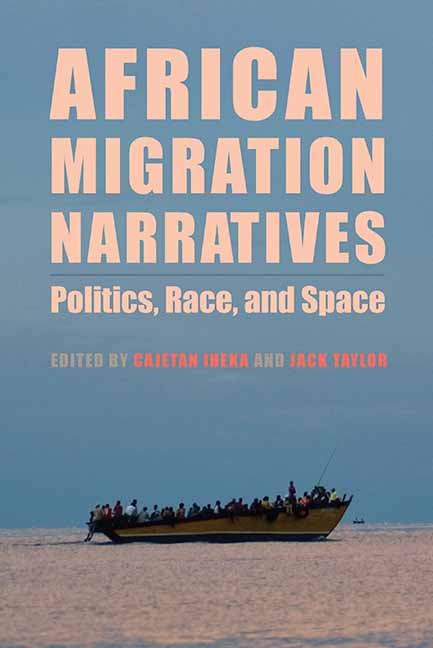Book contents
- Frontmatter
- Contents
- Acknowledgments
- Introduction: The Migration Turn in African Cultural Productions
- Part One African Migration on the Screen: Films of Migration
- Part Two Forgotten Diasporas: Lusophone and Indian Diasporas
- Part Three Migration against the Grain: Narratives of Return
- 8 Reading Space, Subjectivity, and Form in the Twenty-First-Century Narrative of Return
- 9 Looking for Transwonderland: Noo Saro-Wiwa's Migration of the Heart
- 10 The Literary Circulation of Teju Cole's Every Day Is for the Thief
- 11 Speculative Migration and the Project of Futurity in Sylvestre Amoussou's Africa Paradis
- Part Four Migration and Difference: Indigeneity, Race, Religion, and Poetry at the Margins
- Bibliography
- Notes on Contributors
- Index
11 - Speculative Migration and the Project of Futurity in Sylvestre Amoussou's Africa Paradis
from Part Three - Migration against the Grain: Narratives of Return
Published online by Cambridge University Press: 26 July 2019
- Frontmatter
- Contents
- Acknowledgments
- Introduction: The Migration Turn in African Cultural Productions
- Part One African Migration on the Screen: Films of Migration
- Part Two Forgotten Diasporas: Lusophone and Indian Diasporas
- Part Three Migration against the Grain: Narratives of Return
- 8 Reading Space, Subjectivity, and Form in the Twenty-First-Century Narrative of Return
- 9 Looking for Transwonderland: Noo Saro-Wiwa's Migration of the Heart
- 10 The Literary Circulation of Teju Cole's Every Day Is for the Thief
- 11 Speculative Migration and the Project of Futurity in Sylvestre Amoussou's Africa Paradis
- Part Four Migration and Difference: Indigeneity, Race, Religion, and Poetry at the Margins
- Bibliography
- Notes on Contributors
- Index
Summary
Julia Erhart describes speculative fiction as an artistic rendition of “what if.” One thread of the speculative genre is the reversal: what if situations were inverted, what if current hierarchies were flipped? Sylvestre Amoussou's film Africa Paradis envisions reversals of contemporary migration patterns and a peripeteia, or reversal of fortune, in economic terms. In Africa Paradis, devastated European characters, caught in environmental disasters and civil wars between European countries, struggle to migrate to a prosperous, united Africa. While the general direction of imagined future exile is reversed, the representations of border policing resemble present political terrains: familiar cases of xenophobia, discrimination, violence toward migrants sans papiers, paternalistic humanitarianisms, and race-based exclusions abound. There are the familiar lines at embassies, as well as the familiar assignments of manual labor to welleducated, professional migrants whose expertise is not recognized in the new metropolis. There are the smuggling networks, the detention centers, and the scapegoating of the sans papiers.
In his article on Africa Paradis, which he compares to Abdourahman Waberi's United States of Africa, Michael Janis remarks that Amoussou's speculations do not invent “a different world,” but are “a mirror image of our present geopolitical tragedy.” Taiwo Adetunji Osinubi likewise observes “readily recognizable situations of African communities.” Indeed, familiar debates about the status of immigrants are foregrounded in Africa Paradis, except that the immigrants are Europeans and the visa-issuers are Africans. Amoussou himself plays the role of Monsieur Modibo Koudossou, deputy of the Liberal Party in Africa, who plans to introduce a bill that will allow “white integration” into the United States of Africa, or the USAF. The liberal Modibo proposes that immigrants working for five years be allowed to apply for African nationality if they wish, and that qualified immigrants be permitted to obtain jobs beyond the menial ones they are currently eligible for. The integration of migrants is opposed by the character Monsieur Yokossi, the deputy of the Patriotic Party, who states publicly, “Ils sont totalement différent de nous” (They are totally different from us), and “Un blanc ne vaudra jamais un noir” (A white will never be worth a black). Yokossi's words echo the rhetoric of French politicians who oppose African migration, particularly the rhetoric of the Front National (FN), which views itself as the defender of French national identity and paints a sweeping portrait of “clandestine” African immigrants as markedly different, inferior others.
- Type
- Chapter
- Information
- African Migration NarrativesPolitics, Race, and Space, pp. 189 - 200Publisher: Boydell & BrewerPrint publication year: 2018

